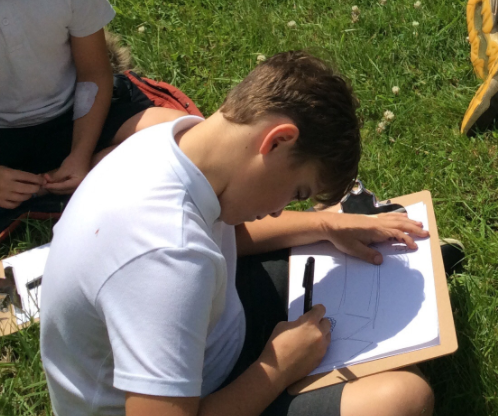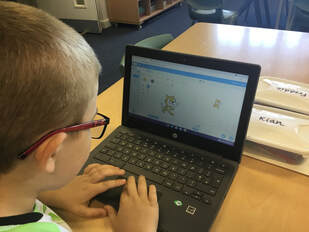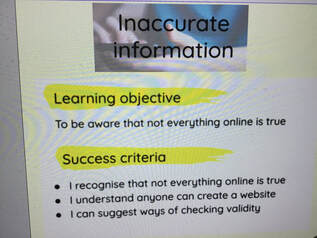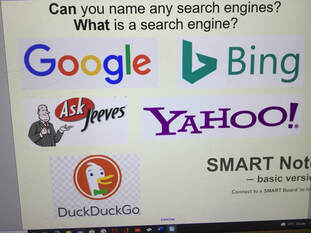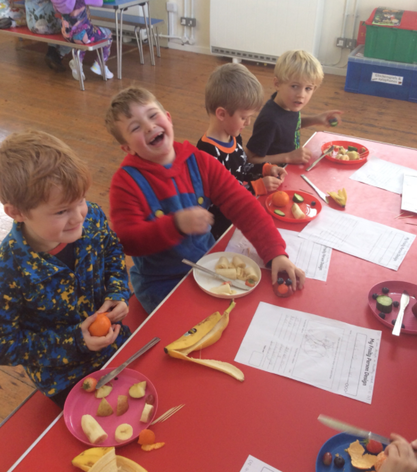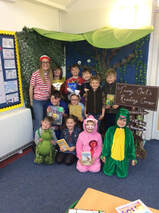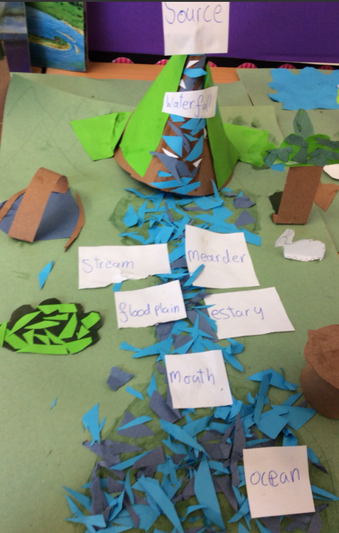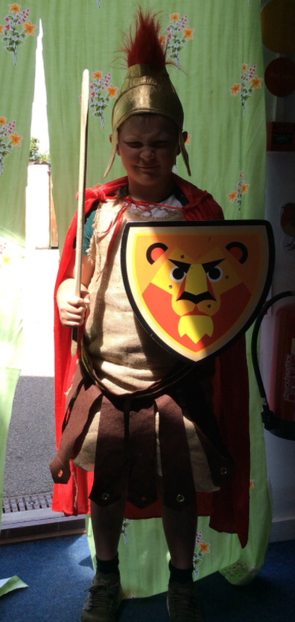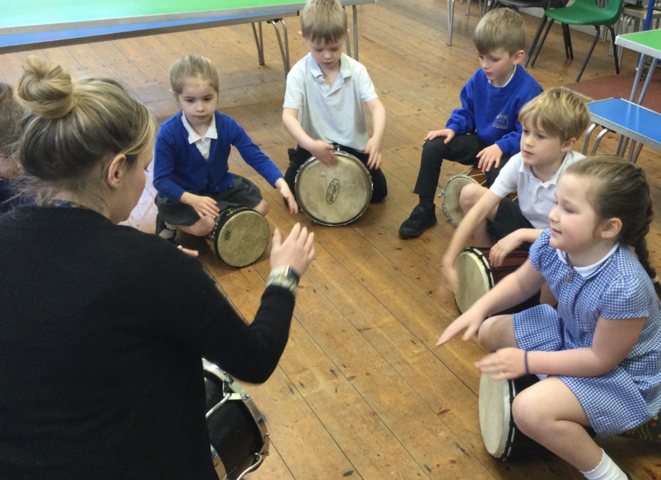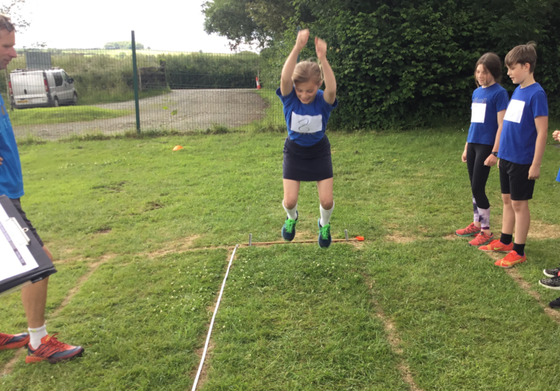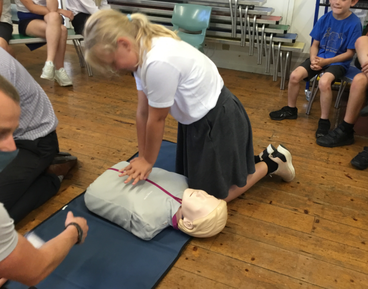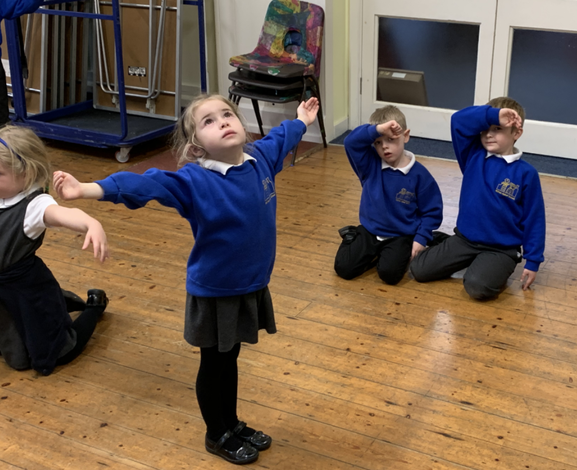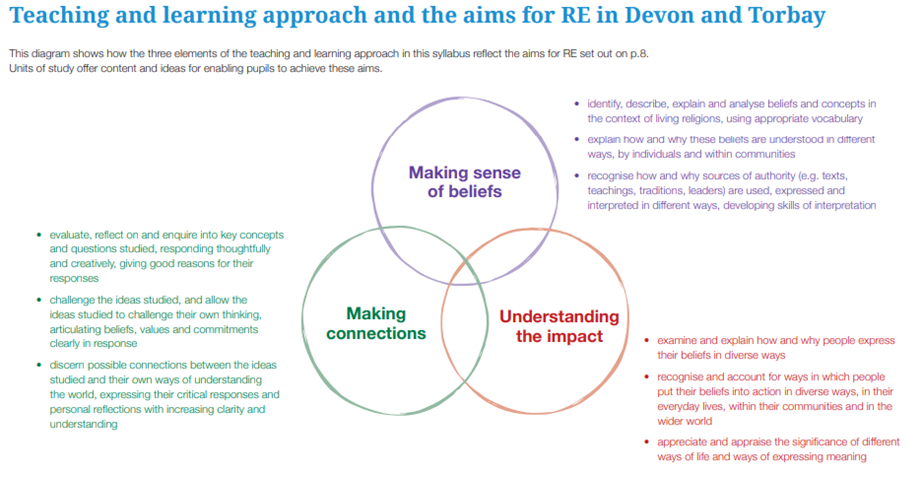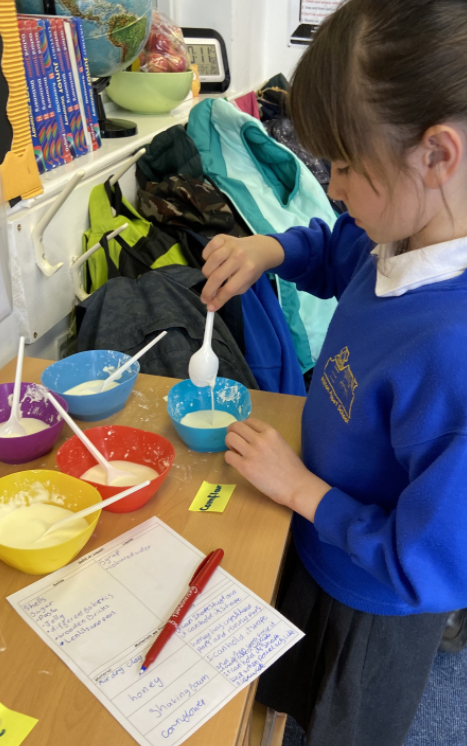Subject Overviews: Every Subject is 'Core'
We consider every subject to be core to the effective development of our pupils ready for the Secondary phase of their education, with memories lasting a lifetime. Every subject stands proudly and we recognise excellent achievements and endeavour in a subject through our weekly awards, such as 'Scientist of the week' or 'Historian of the week', etc.
Explore the pages below to link to our detailed subject overviews and catch a glimpse of the learning in action for each curriculum subject.
Retrieval Strategies
We have designed our curriculum based on the research of Mary Myatt and Rosenshine's principles of instruction. Teachers use a range of strategies to ensure learning becomes secure in the long-term memory of our children. We use daily retrieval strategies in every lesson to recall previous learning either from the previous week, term or the previous year.
Every Child an Artist...
Intent: To engage, inspire and challenge pupils, equipping them with the knowledge and skills to experiment, invent and create their own works of art, craft and design.
We are committed to providing all children with learning opportunities to engage in Art and Design and believe that every child within our school should have full access to the Art provision as laid down in the National Curriculum regardless of age, gender or ability. The intent of our Art education is to give pupils the skills, concepts and knowledge necessary for them to express their responses to ideas and experiences in a visual or tactile form.
Art fires the imagination and is a fundamental means of personal expression. While it is essentially a practical subject, Art should provide opportunities for reflection and, with increasing sensitivity, pupils should acquire the ability to make informed, critical responses of their own work and that of others. There is great pleasure to be derived from Art learning and, through deeper understanding; pupils can gain access to cultural richness and diversity. The appreciation and enjoyment of the visual arts enriches all our lives.
We are committed to providing all children with learning opportunities to engage in Art and Design and believe that every child within our school should have full access to the Art provision as laid down in the National Curriculum regardless of age, gender or ability. The intent of our Art education is to give pupils the skills, concepts and knowledge necessary for them to express their responses to ideas and experiences in a visual or tactile form.
Art fires the imagination and is a fundamental means of personal expression. While it is essentially a practical subject, Art should provide opportunities for reflection and, with increasing sensitivity, pupils should acquire the ability to make informed, critical responses of their own work and that of others. There is great pleasure to be derived from Art learning and, through deeper understanding; pupils can gain access to cultural richness and diversity. The appreciation and enjoyment of the visual arts enriches all our lives.
Every Child Computer confident and creative...
Intent: Our intention is to enable all children to build a greater understanding of how digital programming works. They will become digitally literate – able to use, express themselves and develop ideas through information and communication technology. We want children to become fully aware of how to remain safe online through regular and comprehensive e-safety teaching and learning sessions.
We teach a curriculum that enables children to become effective users of technology who can:
We teach a curriculum that enables children to become effective users of technology who can:
- Understand and apply the essential principles and concepts of Computer Science, including logic, algorithms and data representation;
- Analyse problems in computational term, and have repeated practical experience of writing computer programs in order to solve such problems;
- Evaluate and apply information technology analytically to solve problems;
- Communicate ideas well by utilising appliances and devices throughout all areas of the curriculum.
Every Child a Designer...
Intent: Our intention is for children to be creative, and to develop their imaginations and independence. Children are challenged to plan, design and make products which solve real problems for whole-school projects. Design and Technology is often used in conjunction with other subjects drawing on disciplines such as mathematics, science, engineering, computing and art to develop more meaningful learning experiences.
At Milton Abbot the curriculum for design and technology aims to ensure that all pupils:
At Milton Abbot the curriculum for design and technology aims to ensure that all pupils:
- develop the creative, technical and practical expertise needed to perform everyday tasks confidently and to participate successfully in an increasingly technological world.
- build and apply a repertoire of knowledge, understanding and skills in order to design. and make high-quality prototypes and products for a wide range of users.
- critique, evaluate and test their ideas and products and the work of others.
- understand and apply the principles of nutrition and learn how to cook
Design and Technology: Intent, Impact and Implementation Statement
Every Child a Linguist: French
Intent: To develop children’s interest in and thirst for learning other languages
The study of languages prepares pupils to participate in a rapidly changing world in which work and other activities are increasingly carried out in languages other than English. Language learning provides liberation from insularity and provides an opening to other cultures. Pupils use language to communicate information responsibly and creatively; learning how to use languages to enable access to ideas and experiences from a wide range of people, communities and cultures across our school and wider demographic. In addition, understanding a modern foreign language increases a child’s understanding of their own language, and the building blocks which form this. The process of learning a foreign language reinforces fluency and understanding of grammar, syntax, sentence structure and verbal precision. Increased capability in the use of languages can also promote initiative and independent learning and encourages diversity within society.
The study of languages prepares pupils to participate in a rapidly changing world in which work and other activities are increasingly carried out in languages other than English. Language learning provides liberation from insularity and provides an opening to other cultures. Pupils use language to communicate information responsibly and creatively; learning how to use languages to enable access to ideas and experiences from a wide range of people, communities and cultures across our school and wider demographic. In addition, understanding a modern foreign language increases a child’s understanding of their own language, and the building blocks which form this. The process of learning a foreign language reinforces fluency and understanding of grammar, syntax, sentence structure and verbal precision. Increased capability in the use of languages can also promote initiative and independent learning and encourages diversity within society.
Every Child a Geographer...
Intent: To develop children’s curiosity and fascination about the world and its people that will remain with them for the rest of their lives.
Children investigate a range of places – both in Britain and abroad – to help develop their knowledge and understanding of the Earth’s physical and human processes. We are committed to providing children with opportunities to investigate and make enquiries about their local area of Milton Abbot, Dartmoor and Devon so that they can develop of real sense of who they are, their heritage and what makes our local area unique and special. We also developing the children’s ability to apply geographical skills to enable to confidently communicate their findings and geographical understanding to a range of audiences.
Through high quality teaching, we develop the following essential characteristics of geographers:
Children investigate a range of places – both in Britain and abroad – to help develop their knowledge and understanding of the Earth’s physical and human processes. We are committed to providing children with opportunities to investigate and make enquiries about their local area of Milton Abbot, Dartmoor and Devon so that they can develop of real sense of who they are, their heritage and what makes our local area unique and special. We also developing the children’s ability to apply geographical skills to enable to confidently communicate their findings and geographical understanding to a range of audiences.
Through high quality teaching, we develop the following essential characteristics of geographers:
- An excellent knowledge of where places are and what they are like, both in Britain and the wider world
- A comprehensive understanding of the ways in which places are interdependent and interconnected;
- An extensive base of geographical knowledge and vocabulary;
- Fluency in complex, geographical enquiry and the ability to apply questioning skills, as well as effective presentation techniques;
- The ability to reach clear conclusions and explain their findings;
- Excellent fieldwork skills as well as other geographical aptitudes and techniques;
- The ability to express well-balanced opinions, rooted in very good knowledge and understanding about current issues in society and the environment;
- Genuine interest in the subject and a real sense of curiosity about the world and the people who live here.
|
Geography: Intent, Implementation and Impact. (Geography)
|
Every Child a Historian...
Intent: To inspire children to want to know more about the past and to think and act as historians. We love learning about History, and know the power the stories hold to teach as about the present.
By linking learning, Milton Abbot children have opportunities to investigate and interpret the past, understand chronology, build an overview of Britain’s past as well as that of the wider world, and to be able to communicate historically.
We develop children with the following essential characteristics at Milton Abbot Primary School to help them become historians:
By linking learning, Milton Abbot children have opportunities to investigate and interpret the past, understand chronology, build an overview of Britain’s past as well as that of the wider world, and to be able to communicate historically.
We develop children with the following essential characteristics at Milton Abbot Primary School to help them become historians:
- An excellent knowledge and understanding of people, events and contexts from a range of historical periods, including significant events in Britain’s past;
- Learning about the concept of chronology, which underpins children's developing sense of period, as well as key concepts such as change and causation.
- The ability to think critically about history and communicate ideas confidently to a range of audiences
- The ability to support, evaluate and challenge their own and others’ views using historical evidence from a range of sources;
- The ability to think, reflect, debate, discuss and evaluate the past by formulating and refining questions and lines of enquiry;
- A respect for historical evidence and the ability to make critical use of it to support their learning;
- A desire to embrace challenging activities, including opportunities to undertake high-quality research across a range of history topics;
- A developing sense of curiosity about the past and how and why people interpret the past in different ways
History: Intent implementation and Impact Statement:(History)
Every Child a Musician...
At Milton Abbot Primary School, the intention is that children gain a firm understanding of what music is through listening, singing, playing, evaluating, analysing, and composing across a wide variety of historical periods, styles, traditions, and musical genres.
Our key objective is to develop critical engagement and a curiosity for the subject, as well as an understanding and acceptance of the validity and importance of all types of music, and an unbiased respect for the role that music may wish to be expressed in any person’s life. As with all our expressive arts, we want every child to develop the ability to share their opinions with thought and respect, underpins by experience.
The National Curriculum for Music aims to ensure that all pupils:
• Perform, listen to, review, and evaluate music
• Be taught to sing, create and compose music
• Understand and explore how music is created, produced and communicated.
We are committed to ensuring children understand the value and importance of music in the wider community, and can use their musical skills, knowledge, and experiences to involve themselves in music, in a variety of different contexts.
Our key objective is to develop critical engagement and a curiosity for the subject, as well as an understanding and acceptance of the validity and importance of all types of music, and an unbiased respect for the role that music may wish to be expressed in any person’s life. As with all our expressive arts, we want every child to develop the ability to share their opinions with thought and respect, underpins by experience.
The National Curriculum for Music aims to ensure that all pupils:
• Perform, listen to, review, and evaluate music
• Be taught to sing, create and compose music
• Understand and explore how music is created, produced and communicated.
We are committed to ensuring children understand the value and importance of music in the wider community, and can use their musical skills, knowledge, and experiences to involve themselves in music, in a variety of different contexts.
Every Child Active! Every Child Endeavours!
Physical Education
Intent for P.E: A high-quality physical education curriculum inspires all pupils to succeed and excel in competitive sport and other physically-demanding activities. It should provide opportunities for pupils to become physically confident in a way which supports their health and fitness. Opportunities to compete in sport and other activities build character and help to embed values such as fairness and respect.
The national curriculum for physical education aims to ensure that all pupils develop competence to excel in a broad range of physical activities, are physically active for sustained periods of time, engage in competitive sports and activities. We want our children to lead healthy, active lives, now and into the future.
The national curriculum for physical education aims to ensure that all pupils develop competence to excel in a broad range of physical activities, are physically active for sustained periods of time, engage in competitive sports and activities. We want our children to lead healthy, active lives, now and into the future.
Every Child building confident relationships...
Relationships and Health Education
We firmly believe that an understanding for all pupils of healthy relationships, acceptable behaviour and the right for everyone to receive equal treatment will help ensure that pupils treat each other well and go on to be respectful and kind adults (see our Relationships Education Policy).
Core Values: At Milton Abbot School, we will seek to promote the spiritual, moral, social, cultural, mental and physical development of pupils, at school and in society. Effective teaching in these subjects will ensure that core knowledge is broken down into units of manageable size and communicated clearly to pupils, in a carefully sequenced way, within a planned programme or lessons. Teaching will include sufficient well-chosen opportunities and contexts for pupils to embed new knowledge so that it can be used confidently in real life situations. We will work openly with secondary colleagues to help ensure a smooth transition between primary and secondary phases.
Core Values: At Milton Abbot School, we will seek to promote the spiritual, moral, social, cultural, mental and physical development of pupils, at school and in society. Effective teaching in these subjects will ensure that core knowledge is broken down into units of manageable size and communicated clearly to pupils, in a carefully sequenced way, within a planned programme or lessons. Teaching will include sufficient well-chosen opportunities and contexts for pupils to embed new knowledge so that it can be used confidently in real life situations. We will work openly with secondary colleagues to help ensure a smooth transition between primary and secondary phases.
|
RHE: Overview (scarf)
|
Our 'Relationship and Health Education' policy went out to parent consultation via a Governor Working Party in January 2020. However, we are keen to ensure communication remains open and so please find a contact form below for you to share your views on this policy. Alternatively, you can phone or email the school office, where we will be happy to listen and record your views.
Every Child learning about Religious Beliefs...
Intent: Milton Abbot School follows the legal requirements of the Devon & Torbay SACRE syllabus, applying its principal aim, planning structure and suggested content as our starting points. Pupil discussion, questions and research will then lead further planning. In Key Stage 2, we carry out ‘extended comparison’ projects, whereby pupils directly compare elements of different religions, presenting their research and understanding to others.
The principal aim of religious education is to explore what people believe and what difference this makes to how they live, so that pupils can gain the knowledge, understanding and skills needed to handle questions raised by religion and belief, reflecting on their own ideas and ways of living.
Our teachers design their RE planning to bring the SACRE syllabus to life with hands on learning using real artefacts and visiting real places. Teachers are expected to make links to prior learning, especially significant events and time of the year on an annual basis. They seek to connect the following areas:
The principal aim of religious education is to explore what people believe and what difference this makes to how they live, so that pupils can gain the knowledge, understanding and skills needed to handle questions raised by religion and belief, reflecting on their own ideas and ways of living.
Our teachers design their RE planning to bring the SACRE syllabus to life with hands on learning using real artefacts and visiting real places. Teachers are expected to make links to prior learning, especially significant events and time of the year on an annual basis. They seek to connect the following areas:
Every Child a Scientist...
Intent: Our intention is to provide a high-quality science curriculum that offers opportunities to work scientifically, often in a real life and/or practical context. Science at Milton Abbot aims to inspire curiosity and wonder! We seek to form links between different concepts and scientific language. Indeed, we are keen to inspire a lifelong love of 'discovery' about the world and highlight this through our Curriculum Expert Award, which includes recognising 'Scientist of the Week'. See our slideshow below to catch a snapshot of how we blend working scientifically in a practical way with expert recording and 'hard thinking'.

